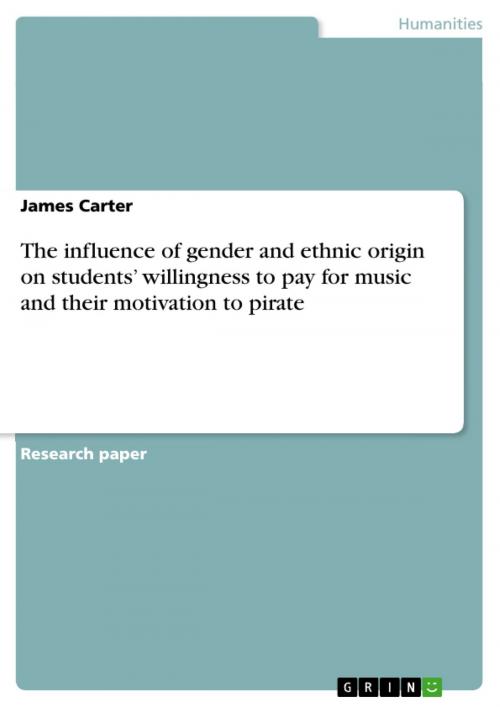The influence of gender and ethnic origin on students' willingness to pay for music and their motivation to pirate
Nonfiction, Social & Cultural Studies, Social Science, Cultural Studies, Popular Culture| Author: | James Carter | ISBN: | 9783668096608 |
| Publisher: | GRIN Publishing | Publication: | November 26, 2015 |
| Imprint: | GRIN Publishing | Language: | English |
| Author: | James Carter |
| ISBN: | 9783668096608 |
| Publisher: | GRIN Publishing |
| Publication: | November 26, 2015 |
| Imprint: | GRIN Publishing |
| Language: | English |
Research Paper (undergraduate) from the year 2013 in the subject Sociology - Media, Art, Music, grade: 1, University of Bath, course: Business Administration, language: English, abstract: The purpose of this study is to assess how gender and cultural norms determine student's motivation and willingness to pay for or to pirate music. To reach a conclusion as to what sort of students engage in music piracy, a university wide survey was performed and students from the UK and international countries were surveyed. There is a need for such a study as it will offer the music industry, marketers and educational institutions an insight into the motivations behind music piracy in university aged students and how their willingness to pay could be determined by their own cultural norms. This in turn could lead to strategies being created to combat music piracy in this age group and demographic and revenues in the music industry to increase. This importance of this topic has recently been highlighted in the 2012 report from the Institute for Policy Innovation which found that music piracy brought about a loss of 71, 060 jobs in the US and an alleged $12. 5 billion loss to the American economy and many believe piracy to be the greatest threat facing the music industry worldwide. World sales of recorded music fell by 7% in value and by 8% in units in 2002 and it has been estimated that almost 40% of all the CDs and cassettes sold around the globe in 2001 were pirated copies. While there are many negative impacts of piracy, other studies argue that from an economic and social standpoint piracy has ensured that more people can enjoy more music at a cheaper cost and has increase net consumer welfare, and that piracy ensures a continued interest and increased awareness or a wider range of music and thus benefiting the industry firms in the long term through increased revenue from concerts and festivals. The Music industry, however, is strongly fighting individuals who either knowingly or unknowingly pirate copyrighted music. This is done in the belief that in prosecuting these individuals and making an example of them in the media, other potential music 'pirates' will be deterred. A lawsuit in 2004 where 532 university students were sued by the RIAA (Recording Industry Association of America) for illegal downloading, highlights the length the industry will go to to combat illegal music downloaders as well as the issues the industry believes they are facing from the young, online generation.
Research Paper (undergraduate) from the year 2013 in the subject Sociology - Media, Art, Music, grade: 1, University of Bath, course: Business Administration, language: English, abstract: The purpose of this study is to assess how gender and cultural norms determine student's motivation and willingness to pay for or to pirate music. To reach a conclusion as to what sort of students engage in music piracy, a university wide survey was performed and students from the UK and international countries were surveyed. There is a need for such a study as it will offer the music industry, marketers and educational institutions an insight into the motivations behind music piracy in university aged students and how their willingness to pay could be determined by their own cultural norms. This in turn could lead to strategies being created to combat music piracy in this age group and demographic and revenues in the music industry to increase. This importance of this topic has recently been highlighted in the 2012 report from the Institute for Policy Innovation which found that music piracy brought about a loss of 71, 060 jobs in the US and an alleged $12. 5 billion loss to the American economy and many believe piracy to be the greatest threat facing the music industry worldwide. World sales of recorded music fell by 7% in value and by 8% in units in 2002 and it has been estimated that almost 40% of all the CDs and cassettes sold around the globe in 2001 were pirated copies. While there are many negative impacts of piracy, other studies argue that from an economic and social standpoint piracy has ensured that more people can enjoy more music at a cheaper cost and has increase net consumer welfare, and that piracy ensures a continued interest and increased awareness or a wider range of music and thus benefiting the industry firms in the long term through increased revenue from concerts and festivals. The Music industry, however, is strongly fighting individuals who either knowingly or unknowingly pirate copyrighted music. This is done in the belief that in prosecuting these individuals and making an example of them in the media, other potential music 'pirates' will be deterred. A lawsuit in 2004 where 532 university students were sued by the RIAA (Recording Industry Association of America) for illegal downloading, highlights the length the industry will go to to combat illegal music downloaders as well as the issues the industry believes they are facing from the young, online generation.















